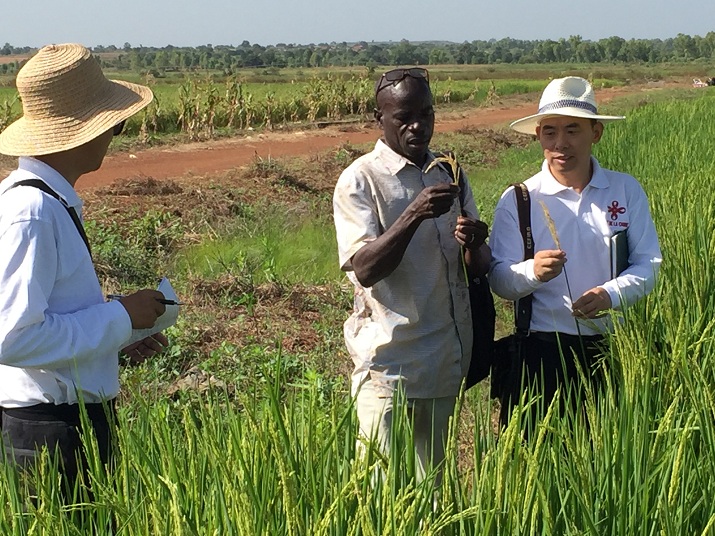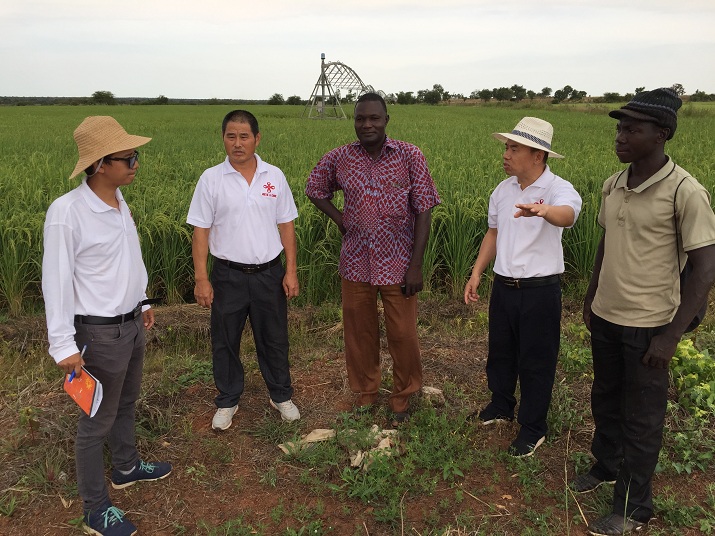|
||||||||||
| Home Nation World Business Opinion Lifestyle ChinAfrica Multimedia Columnists Documents Special Reports |
|
||||||||||
| Home Nation World Business Opinion Lifestyle ChinAfrica Multimedia Columnists Documents Special Reports |
| ChinAfrica |
| Cultivating Solutions |
| Chinese agricultural experts assist Burkina Faso raise rice yield |
| By Li Jing | VOL.11 June ·2019-06-03 |

Hu Yuzhou (right) and a local technician investigate pest control (COURTEST PHOTO)
In Burkina Faso's Bagre Reclamation Area, clear water from a large reservoir far away is flowing along a brand-new ditch into a four-hectare flat farmland, which is part of the Bagre land-leveling project completed on March 30, with the assistance of Chinese agricultural experts.
"With the technology we have, it was difficult for us to complete the land-leveling project and bring irrigation water to the area on our own, which was a major obstacle to growing rice. But now, we can drain and irrigate freely," Étienne Kaboré, head of Bagre Growth Pole Integrated Development Corp., the managing organization of the Bagre Reclamation Area, told Chinese agricultural expert Hu Yuzhou with excitement.
Just a few months ago, the land was dry and harvest was dependent on nature's mercy. The situation changed after the arrival of the experts of the first agricultural expert mission sent by the Ministry of Agriculture and Rural Affairs of China to Burkina Faso after the resumption of diplomatic relations between the two countries on May 26, 2018. Hu is head of the Bagre Reclamation Area Project and deputy chief of the expert mission.
Hu, 48, is a senior agronomist at the Bureau of Agriculture and Rural Affairs of Xianning, central China's Hubei Province. He is also a director of the province's Plant Protection Society and Plant Pathology Society. In his career spanning 27 years, Hu has won multiple awards from the province for his hard work and achievements in promoting and advancing agricultural technology.
He also has rich experience in working in Africa. In 2009, he was chosen as one of the 100 Senior Agricultural Experts for Africa, a project announced by the Forum on China-Africa Cooperation, and was sent on an aid mission to Zimbabwe, where he won the Outstanding Contribution Award from the Chinese Embassy in Zimbabwe.
"I was born and raised in the countryside of China and food was insufficient when I was a kid. I have personally experienced the tremendous changes brought about by China's development," he told ChinAfrica. "Africa's natural conditions for agriculture are no worse than China's, so it is absolutely feasible to promote China's experience in agricultural development in Africa. I hope I can do my part for this cause."
Water management
Agriculture is the pillar industry of this landlocked country in West Africa. About 80 percent of its labor force is employed in the agricultural sector. Due to low agricultural productivity, however, the country is heavily dependent on imported food and is vulnerable to food crises. After its diplomatic relations with China were resumed, agriculture was put on the top of the list of areas for assistance. At the request of Burkina Faso, China dispatched the first team of seven agricultural experts, including Hu, at the end of June 2018.
To familiarize themselves with local agricultural production, the team conducted 37 surveys in 11 major regions of the country. With the Sahara Desert to the north, water shortage has been a major problem for local agriculture, and because of water shortage, rice produced in Burkina Faso can only meet a quarter of the country's demand.
"The key to increasing rice production is water," Hu said.
However, surveys showed that the average annual rainfall in Ouagadougou, capital of Burkina Faso, was 743.8 mm, higher than 626 mm in Beijing and 583.6 mm in London. "This means that the problem for Burkina Faso is not water shortage in the absolute sense, but the failure to conserve and make good use of water," Hu explained to ChinAfrica.
Located in the southeastern part of Burkina Faso, Bagre Reclamation Area is a special agricultural zone developed by the local government and is the largest riceproducing area in the country. However, due to uneven land and lack of water facilities, irrigation relied mostly on rainfall, which seriously hindered rice growth. As the manager of Bagre Reclamation Area project, Hu decided to start with improving water infrastructure. The land needed to be leveled and canals built to ensure water supply.
Hu and other experts of the mission personally went through the whole process from site selection and measurement to construction, with the support of local farmers. After three months of efforts, 4 hectares of land was leveled and a 415-meter concrete canal system for irrigation was built.
"Hu has worked hard and made remarkable achievements. He has played an important role in improving technology in the largest rice planting area of our country," said Sanou Gaoussou, an official of Burkina Faso's Ministry of Agriculture and Hydraulic Facilities and the general coordinator of China's aid projects.

Hu Yuzhou (second right) on a field investigation (COURTESY PHOTO)
Green development
Now that the water infrastructure was ready, Hu and the team proceeded to improve local technology in rice production. He found that overuse of pesticides posed a threat to the local environment.
"China, like many other countries, had to clear the pollution caused by prior development. We hope that Burkina Faso would learn the lesson, and adopt a green approach for development as soon as possible. Replacing chemical pesticides with technical means, for example, can help protect the environment and promote sustainable development of agriculture," Hu said.
Therefore, he decided to apply China's green pest control technology in Burkina Faso. He targeted rice stem borers with the 10 pheromone traps he had brought from China. These traps enabled green insect control that combined physical and biological means.
Promoting China's rice cultivation technology is another focus of the team. So far they have completed 1 hectare of rice seed production and 1 hectare of experimental demonstration of rice planting. With a proper increase in planting density, well-managed fertilizer and water use and effective pest and disease control, the yield per hectare has increased from 2 tons to 5 tons.
Technical assistance
"China's aid policy is focused on technical assistance. We provide aid and, more importantly, we teach them how to do it," Hu said.
Technical guidance and training are among the most important tasks of the expert mission. In the Bagre Reclamation Area alone, the experts have provided trainings to 115 agricultural technicians and local farmers, and made multiple demonstrations for nearly 200 people. Across Burkina Faso, 30 large-scale onsite agricultural technology trainings have been conducted in 14 provinces by the whole aid team, attracting more than 1,500 trainees.
"The trainees are eager to learn China's agricultural technology, and they often ask questions for more than 2 hours at the end of trainings. Our trainings are provided wherever they are needed," Hu said.
"The agricultural technology team is the most disciplined and successful Chinese aid team in Burkina Faso with the widest reach across the country," said Li Jian, China's Ambassador to Burkina Faso. The first agricultural aid project will complete its 1-year term on June 30, 2019. After that, the experts will stay for another 2 years in Burkina Faso for the second aid mission.
(Comments to lijing@chinafrica.cn)
| About Us | Contact Us | Advertise with Us | Subscribe |
| Copyright Beijing Review All rights reserved 京ICP备08005356号-5 京公网安备110102005860号 |